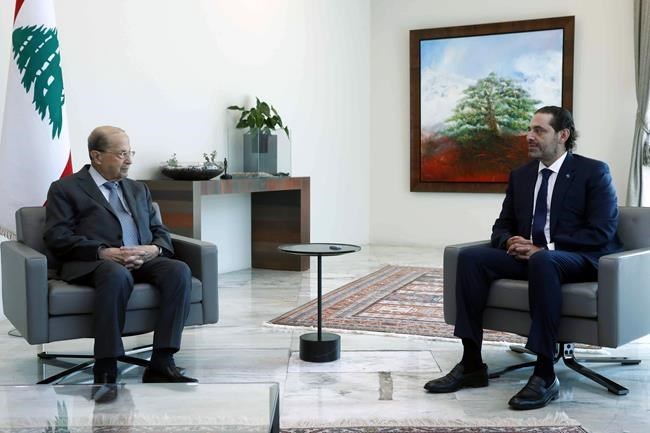BEIRUT (AP) — Lebanon’s Prime Minister-designate Saad Hariri stepped down Thursday, citing “key differences” with the president after nine months of political wrangling that failed to put together a government for the crisis-ridden country.
The development is likely to plunge Lebanon further into chaos and uncertainty amid an unprecedented economic breakdown and dim prospects for a recovery package from the International Monetary Fund.
“It is clear that we will not be able to agree with the president,” Hariri said after a 20-minute meeting with President Michel Aoun. “I have excused myself from forming the government. May God help the country.”
In a last-ditch effort to end the political deadlock, Hariri had also met with Aoun on Wednesday, when he proposed a new 24-member Cabinet and said he expected a response from the president by Thursday.
International calls have mounted for Lebanese leaders to form a new government. In an unusual move, the French and U.S. ambassadors to Beirut recently traveled to Saudi Arabia to discuss Lebanon with Saudi officials. The two said Lebanon is in “desperate need” of a new, pro-reform government to lead it out of its economic and financial crisis.
But for months, the effort has been blocked by a power struggle between Hariri on one side and Aoun and his son-in-law, Gebran Bassil, who heads the largest bloc in parliament, on the other.
They locked horns over the shape of the Cabinet that will oversee critical reforms and elections. Each side blamed the other for the deadlock, which has paralyzed Lebanon even as the economic meltdown accelerated. The national currency has plunged in value, poverty has deepened and inflation has spiraled.
Nabil Bou Monsef, a political commentator in An-Nahar newspaper, said Hariri’s resignation deepens the crisis, predicting that naming a new prime minister would now be even more difficult.
“We may not be able to form a government or find an alternative to Saad Hariri,” Bou Monsef said. “President Michel Aoun will now consider himself victorious in getting rid of Saad Hariri. But in reality, (Aoun) has opened the gates of hell for the whole country and his rule.”
Aoun in turn has blamed Hariri for the deadlock, saying the premier-designate did not respect the national consensus.
Regional and international mediation has failed to bridge the differences between the two sides. European Union Foreign policy Chief, Josep Borrell, said during a visit to Lebanon last month that a power struggle and a case of strong mistrust is at the heart of the fight between the political leaders.
It is unclear who could replace Hariri. In the coming days, Aoun is expected to set a date for consultations with parliamentary blocs to name a new prime minister-designate.
Hariri, one of Lebanon’s most powerful Sunni Muslim leaders, did not publicly endorse his replacement. According to Lebanon’s sectarian-based political system, the prime minister is picked from the ranks of Sunnis.
The 51-year-old Hariri has served as prime minister twice before, the first time from 2009-2011. His second time came in 2016, in an uneasy partnership with Aoun, an ally of the Shiite militant Hezbollah group, which is backed by Iran. At the time, Hariri had backed Aoun for president, ending nearly two years for Lebanon without a head of state, while he stepped in as premier.
Also, in 2017, in a reflection of a feud between Saudi Arabia and its regional rival Iran, Hariri suddenly resigned in a televised address from Riyadh and accused Hezbollah of taking Lebanon hostage. The move was seen as forced on Hariri by the Saudis, and he was quickly restored but it signaled the end of his traditional alliance with the Sunni regional powerhouse.
Then, in October 2019, Hariri resigned, bowing to nationwide protests demanding major reforms. A year later, he was named once again to the post by parliament, months after the government of Hassan Diab resigned in the wake of the massive Aug. 4 explosion in Beirut’s port. More than 200 people died in the blast that defaced the city and injured thousands, compounding Lebanon’s woes. An investigation continues into what caused it.
Talks with the International Monetary Fund also came to a halt after Diab’s resignation.
The political deadlock left no one to address the spiraling economic crisis, rooted in years of mismanagement and corruption. The Lebanese pound, pegged to the dollar for nearly 30 years, has been in a free fall, losing more than 90% of its value since late 2019.
After news broke of Hariri stepping down, the pound hit a new low, selling for 20,000 to the dollar on the black market.
Lebanon’s economy contracted by over 20% in 2020 and poverty deepened, with more than 55% of the population living below the poverty line. Prices of basic needs in the import-dependent country soared. Power outages have increased, and long lines for fuel and increasingly harder-to-find medicine are a daily sight.
___
Associated Press writer Bassem Mroue in Beirut contributed to this report.
Sarah El Deeb, The Associated Press


